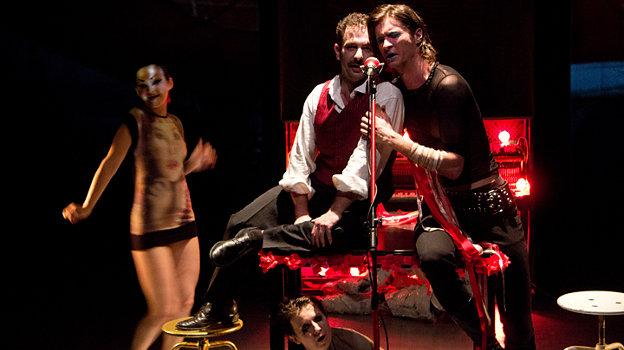None shall sleep, not if Poland’s NeTTheatre have anything to do with it… Leather queens in bullet belts and kitten heels belting out karaoke versions of ‘Nessun Dorma’; a bank of Barbie dolls mounted on table football rods and real-life Barbie-doll-girls dancing disjointed dances; the incessant looping of snatches of Turandot’s score; a mannequin hung by its neck from the ceiling; a woman caged under a kitchen table; a kitsch 70s-style home organ belting out opera faves, blood-red washes of light, armies of miniature figures, Chinese lanterns and lacquers, projections of flock wallpaper everywhere – and always the silent screams of those with no voice. ‘If I could write one word on a piece of paper it would be “shame’’.’
It’s a nightmare. A bloody mess. A brilliant bloody mess. A wonderful postmodern deconstruction of Puccini’s last opera, a story of the Chinese princess Turandot (who tells riddles and puts to death suitors who cannot solve them), mulched in with the tragic real life story of the throat cancer the composer developed whilst trying to finish this last major work of his life, and the terrible treatments he endured (we learn at one point that he has his lips ‘bound together’). All of this is informed by the fact that this work has been devised in collaboration with an ensemble of people with and without hearing and speaking disabilities. To hear, to speak, to voice, to lose voice, to be denied voice… what these mean, literally and metaphorically, are explored throughout the piece. The meaning and value of ‘silence’ is explored: enormous close-ups of silent screaming faces give way to words spoken haltingly: ‘When I am silent I give him pure love.’ Just to add to the lunacy, William Burroughs’ hallucinogenic masterpiece Naked Lunch also supplies meat for this feast…
Director, writer, sound designer – auteur I suppose best describes him – Pawel Passini uses every trick in the theatrical book: live and recorded music (arias heard on scratchy recordings, the live singing onstage, looped samples, easy-listening organ playing), puppetry of many scales, film (including some horribly compelling footage of young Chinese gymnasts being tested to the limits: Turandot’s Chinese themes and tropes are another element to the piece), cabaret pastiche, Kantor-esque stepping out of and observation of the action by ‘silent’ (in myriad senses of that word) witnesses.
Bold and brave and beautiful; a show I’m drawn to see more than one time. One of the most interesting and inspiring shows at this year’s Fringe. I think I’ll have to go back for more; there is so much to experience and unravel…


